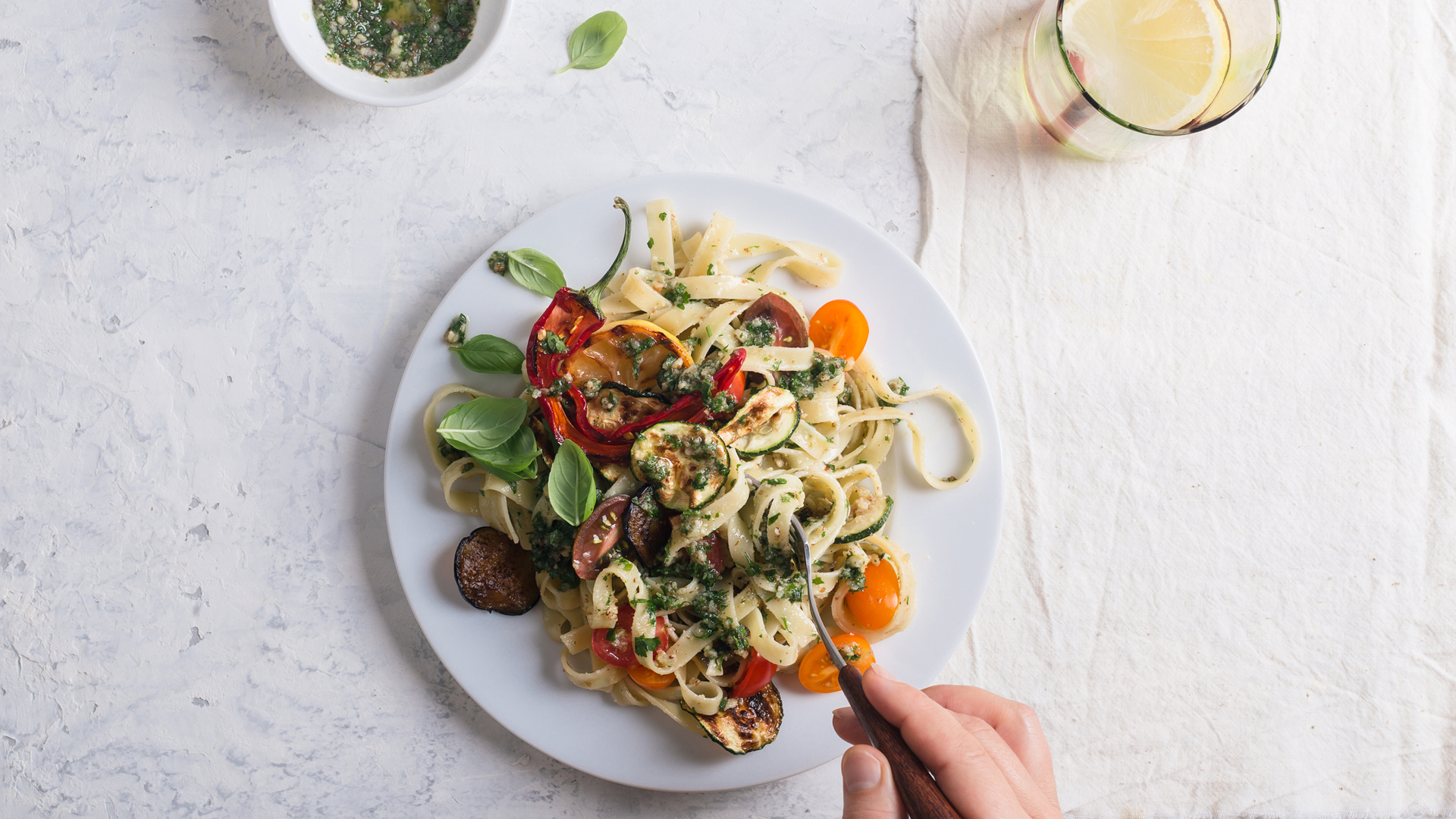How to eat a vegan Mediterranean diet: A complete guide
Is it possible to eat a vegan Mediterranean diet? We look at how to adapt this popular approach to suit a plant-based way of living

Is a vegan Mediterranean diet something that you've considered? Plant-based diets have been praised for their wide-ranging health benefits, particularly in relation to cardiovascular disease, metabolic issues and cancer. But is it possible to eat a vegan Mediterranean diet?
The Mediterranean diet is universally considered to be one of the healthiest diets in the world. Multiple studies have shown that it significantly reduces the risk of developing many chronic conditions, including cardiovascular disease, hypertension, obesity and type 2 diabetes (check our article on the seven science-backed benefits of the Mediterranean diet to find out more). But with plant-based diets getting increasingly more popular, there’s been a considerable interest in a vegan Mediterranean diet as a way to combine these two dietary patterns.
Some studies suggest that vegan diets may not only have a higher nutritional value than the Mediterranean diet, but they also may be better for the environment. This so-called ‘greener’ Mediterranean diet could provide a perfect solution to the diet-environment-health dilemma by simultaneously addressing the impact of consuming animal-based products and the steep rise in diet-related diseases.
Here, we’ll look at the key principles of a vegan Mediterranean diet and present a complete guide to get you started on a ‘greener’ version of one of the healthiest diets in the world.
What is a vegan Mediterranean diet?
The Mediterranean diet is an umbrella term used to describe the traditional dietary habits of people from countries surrounding the Mediterranean sea. It’s a geographically vast region, so naturally there will be some differences between the cuisines of the likes of Italy, Greece or the Middle East. Still, there are certain things that all of these regions have in common.
The key principles of the Mediterranean diet are to cook from scratch, avoid highly processed foods and eat substantial amounts of seasonal fruit and vegetables, as well as wholegrains, legumes, fish, nuts, seeds, herbs, spices and olive oil.
The Mediterranean diet approach is largely based on plant-based foods, but it’s not considered vegan. Regular consumption of animal-based products like fish and dairy products plays a big part in this nutritional approach. Certain plant-based food items commonly included in the Mediterranean diet may also require using animal derivatives during the production stage, such as red wine.
Fortunately, there are many easy swaps that can make a vegan Mediterranean diet a possibility.
How to follow a vegan Mediterranean diet
One of the major concerns behind plant-based diets is their ability to provide enough quality protein to build and maintain muscle mass. Fish, meat and eggs contain all necessary amino acids (the building blocks of protein) whereas plants may not. One strategy to ensure a more balanced amino acid profile on a vegan diet is to ‘mix and match’ multiple incomplete protein sources. For example, pitta bread on its own doesn’t contain much of an essential amino acid called lysine. However, you can improve its protein profile by adding some lysine-rich hummus on top. Another option is to opt for complete plant protein sources such as soy and soy products (tofu and tempeh), quinoa, buckwheat, chia seeds, hemp seeds and spirulina.

Moderate consumption of dairy products is an important component of the Mediterranean diet. Thankfully, there’s a wide variety of plant-based milks, yogurts and cheeses available on the market nowadays. Simply swap the dairy for an alternative of your choice – although bear in mind that some of these can be more processed than their dairy counterparts.
Similarly, it’s fairly easy to get a bottle of vegan red wine as most of the wine producers will include this information on their labels. Look out for the green V symbol – it’s a sign that the product did not involve any animal derivatives.
Still not sure how to get started on a vegan Mediterranean diet? Try some of these tasty meal ideas.
Breakfast ideas
- Overnight oats with apples and cinnamon
- Tofu scramble
- Whole grain bread sandwiches with hummus, cucumber and chives
Lunch ideas
- Sweet potato jackets with guacamole and kidney beans
- Falafel and hummus veggie wrap
- Black bean and quinoa buddha bowl
Dinner ideas
- Crispy tofu and broccoli stir fry
- Veggie beetroot burgers
- Slow cooker Mediterranean stew with chickpeas and olive oil
Do you need to take supplements on a vegan Mediterranean diet?
Following a vegan Mediterranean diet may result in certain nutrient deficiencies, particularly vitamin B12, iron, zinc, calcium, and vitamin D, as well as omega-3 fatty acids eicosapentaenoic acid (EPA) and docosahexaenoic acid (DHA). Most of these can be addressed by adding specific plant-based foods to your diet, such as beans, lentils, tahini and sesame seeds. Still, supplementation may be necessary in certain cases.
Vitamin B12 is almost impossible to obtain from a vegan diet. Only certain types of algae contain substantial amounts of this micronutrient, but they’re not particularly suitable for human consumption. The good news is, many breakfast cereals and drinks are fortified with B12 vitamins and it’s relatively easy to find a good supplement.

Getting adequate amounts of Vitamin D could also be problematic, particularly if you live in a country with low amounts of sunlight. Vegan sources of vitamin D include fortified mushrooms, breakfast cereals and plant-based milks. Considering how important this nutrient is for our health, it’s a good idea to consider supplements.
Maintaining a good intake of omega-3 fatty acids may also prove to be a difficult task. Most plant-based sources of omega-3 are seaweeds, leafy greens, tahini, nuts and seeds, particularly hemp seeds, chia seeds, walnuts, and flaxseeds. However, most vegan sources contain mainly alpha-linolenic acid (ALA), which our bodies cannot sufficiently convert into EPA and DHA acids. As such, supplementation may be beneficial. But don’t worry about ingesting any animal-based products. Most vegan EPA and DHA supplements are derived from algae and are clearly labeled as vegan.
Sign up for the Live Science daily newsletter now
Get the world’s most fascinating discoveries delivered straight to your inbox.

Anna Gora is a health writer at Live Science, having previously worked across Coach, Fit&Well, T3, TechRadar and Tom's Guide. She is a certified personal trainer, nutritionist and health coach with nearly 10 years of professional experience. Anna holds a Bachelor's degree in Nutrition from the Warsaw University of Life Sciences, a Master’s degree in Nutrition, Physical Activity & Public Health from the University of Bristol, as well as various health coaching certificates. She is passionate about empowering people to live a healthy lifestyle and promoting the benefits of a plant-based diet.










